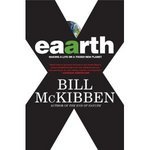Sustaining Life on a Tough New Planet
Bill McKibben
Thursday, 14 Oct 2010 at 8:00 pm – Great Hall, Memorial Union
Author and environmentalist Bill McKibben writes about global climate change, alternative energy, and economics. His new book is Eaarth: Making Life on a Tough New Planet. His other books include Wandering Home: A Long Walk through America's Most Hopeful Landscape; The End of Nature; Hope, Human and Wild; and The Age of Missing Information. McKibben is a former staff writer for the New Yorker and a frequent contributor to Harper's, Atlantic Monthly and Outside. He is also the founder of 350.org, an international organization whose mission is to inspire the world to rise to the challenge of climate change with practical actions. The 2010 Pesek Colloquium on Sustainable Agriculture and part of the Live Green Sustainability Series.Listen to an interview with Bill McKibben on NPR’s Speaking of Faith - The Moral Math of Climate Change
Cosponsored By:
- Agronomy
- Bioeconomy Institute
- Bioethics Program
- College of Agriculture and Life Sciences
- College of Liberal Arts and Sciences
- Ecology, Evolution, and Organismal Biology
- English
- Leopold Center for Sustainable Agriculture
- Natural Resource Ecology and Management
- Practical Farmers of Iowa
- Wallace Chair for Sustainable Agriculture
- Committee on Lectures (funded by Student Government)
Stay for the entire event, including the brief question-and-answer session that follows the formal presentation. Most events run 75 minutes.
Sign-ins are after the event concludes. For lectures in the Memorial Union, go to the information desk in the Main Lounge. In other academic buildings, look for signage outside the auditorium.
Lecture Etiquette
- Stay for the entire lecture and the brief audience Q&A. If a student needs to leave early, he or she should sit near the back and exit discreetly.
- Do not bring food or uncovered drinks into the lecture.
- Check with Lectures staff before taking photographs or recording any portion of the event. There are often restrictions. Cell phones, tablets and laptops may be used to take notes or for class assignments.
- Keep questions or comments brief and concise to allow as many as possible.





